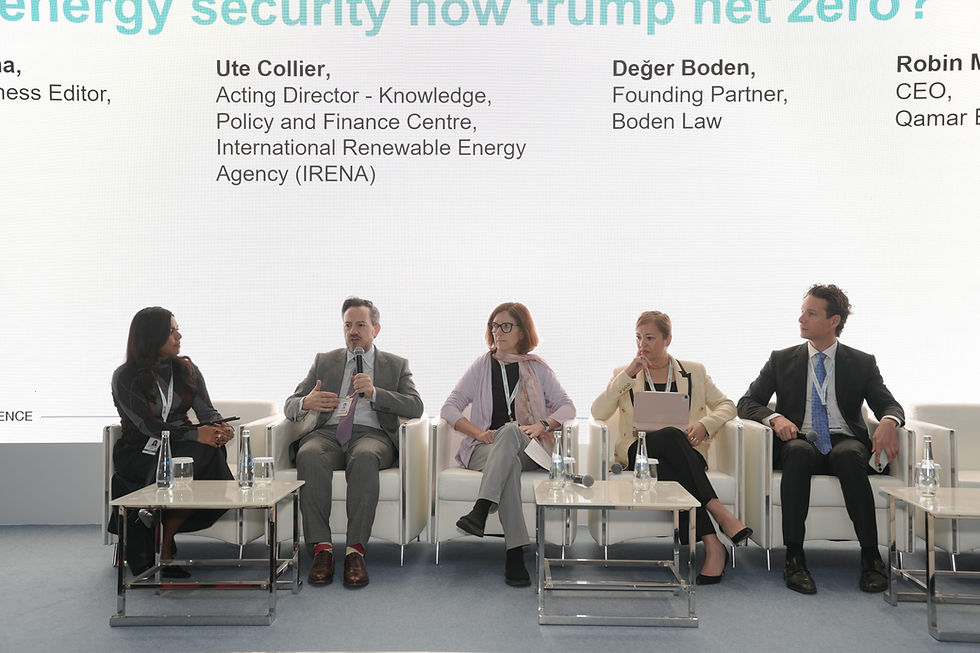New podcast: Addressing Waste Management Challenges in MENA
- Ethan Fulton

- Oct 26, 2023
- 3 min read
Updated: Apr 23, 2024
On October 3, 2023, Jeffrey Beyer moderated Episode 7 of the Future Energy Insights podcast. Sponsored by the World Future Energy Summit, the series takes an in-depth look at renewable energy and sustainability topics.
Click the icon to access the episode.
Waste management is an important topic with links to the energy transition, and Episode 7 zeroes in on how to address some its challenges in the MENA region.
Jeffrey Beyer is joined by:
Ali Al Dhaheri, the CEO of Tadweer — the Abu Dhabi Waste Management Company
Nivine Issa, who has headed up environmental and waste engineering teams in the region across a range of MENA projects
Dr. Samar Alghalebi, Director at Smart Waste & Energy Solutions headquartered in Dubai
Progress in waste management is intertwined with UN Sustainable Development Goal #11: "Make cities and human settlements inclusive, safe, resilient, and sustainable".
Waste management has become a major issue for public health amidst population growth, rapid urbanization and widespread consumerism. The amount of solid waste generated globally is projected to double to 4 billion tons by 2050. In particular, the GCC has a very high waste footprint (2 kg per person per day, nearly double the global average) that is largely sent to landfills. However, waste presents a great opportunity to use innovative technologies and new initiatives to redesign, reduce, reuse, recycle and ultimately recover value from waste, including using it for energy.
Al Dhaheri, in his role as the CEO of Tadweer, says that "very ambitious targets" are in place to divert 80% of Abu Dhabi's waste away from landfills by 2030. This will require an effort to "prioritize the full value chain". The development and implementation of energy conversion technologies will be crucial. These commitments align with the UAE's commitments to minimize pollution and reduce its climate footprint, while acting as an emerging leader in artificial intelligence and other technologies.
According to Issa, "every day there's something new" but waste management remains at the top of net-zero plans and sustainability visions. The Kingdom of Saudi Arabia has similarly ambitious plans to divert construction waste and treat 100 million tons of waste by 2035.
Al Dhaheri is collaborating with Khalifa University in Abu Dhabi to support the development of homegrown innovations and take advantage of a local talent base while learning from international best practices. The UAE is forging ahead with several high-profile waste management initiatives like the Sharjah Waste-to-Energy Project, generating electric power with more than 37.5 tons per hour of municipal solid waste and the world's largest waste-to-energy facility in Dubai's Warsan.
Legal reforms and changes in building codes have spurred the development of comprehensive waste management plans in the UAE. Collaboration between businesses, governmental entities, and investors as well as constant review of legislative frameworks is continually needed.
Looking ahead, Al Dhaheri is particularly hopeful for regional and global initiatives as economies within the region transition from linear to circular, but acknowledges the challenges ahead in bridging policy gaps, altering behavior, and scaling up sustainable practices. Issa highlights the importance of COP28 in Dubai this year to give the UAE a voice on the global stage and an avenue for collaboration between multiple stakeholders.
Sustainability is a continual learning process, requiring ambition and unwavering commitment, that requires staying informed. But the signs are encouraging in waste management and sustainability consultancy as the region transforms from the top of the value chain. "If you can measure it, you can manage it," says Alghalebi.
Stay tuned for future episodes of the Future Energy Insights podcast - available on Apple Podcasts, Google Podcasts, and Spotify.




Comments